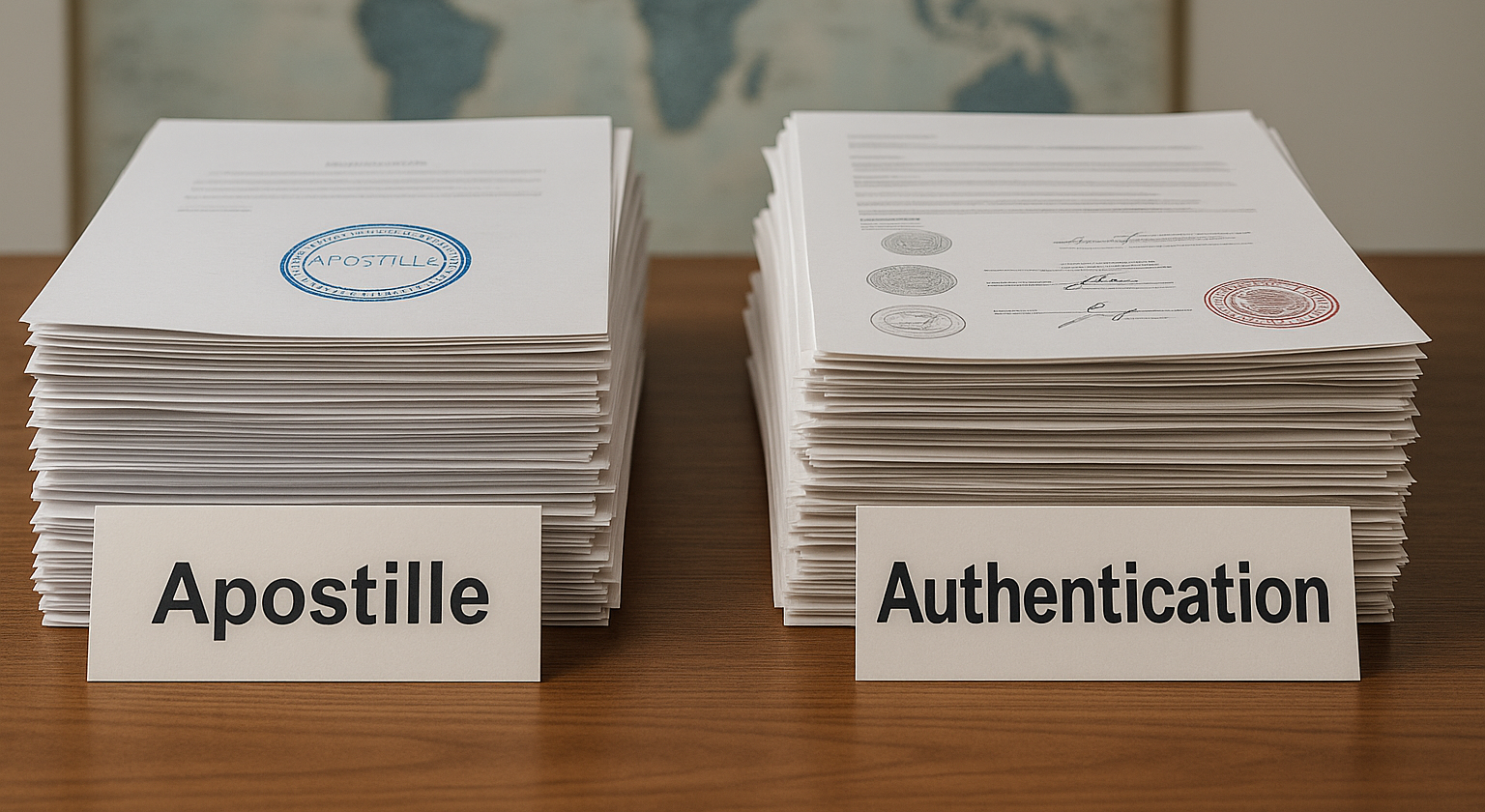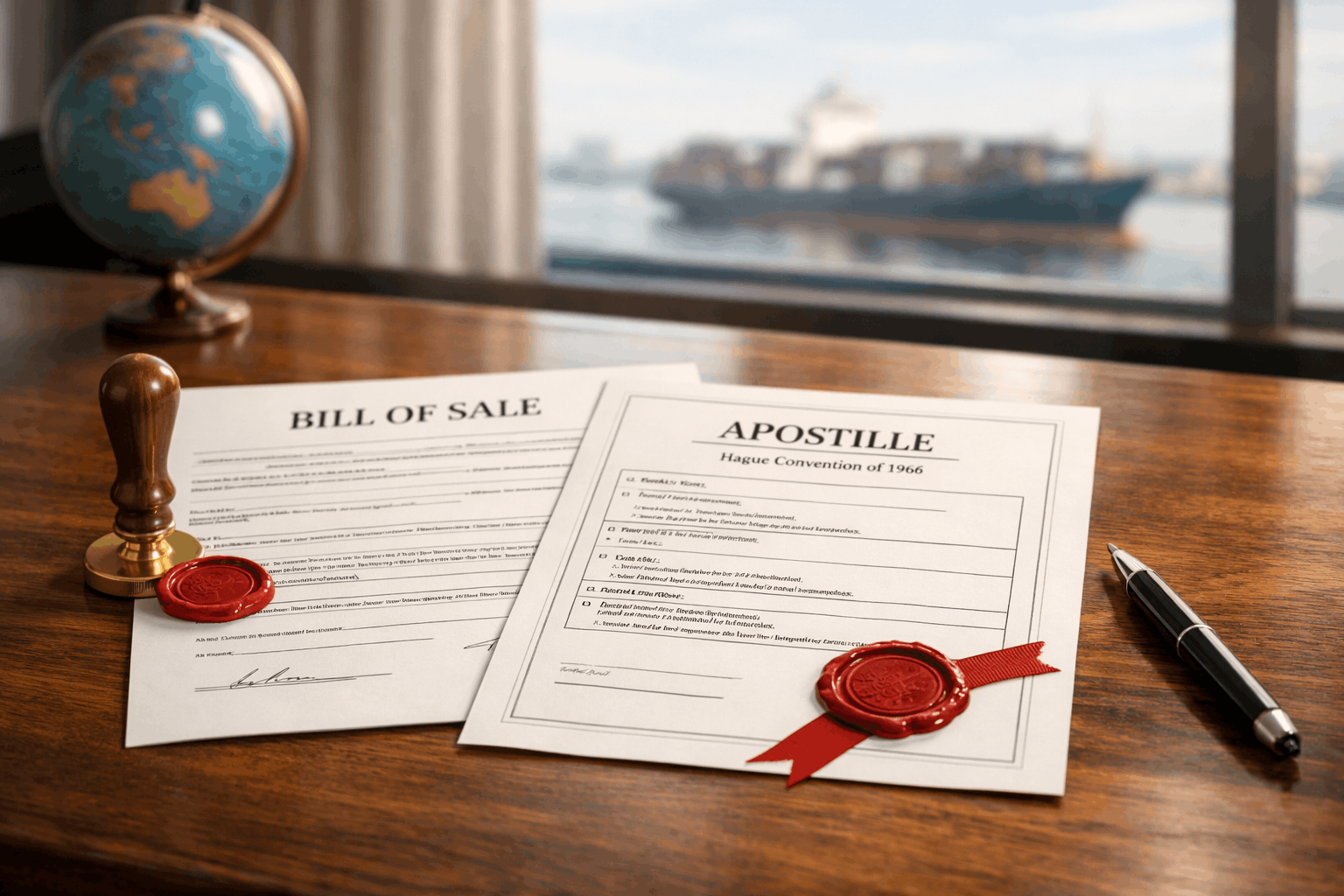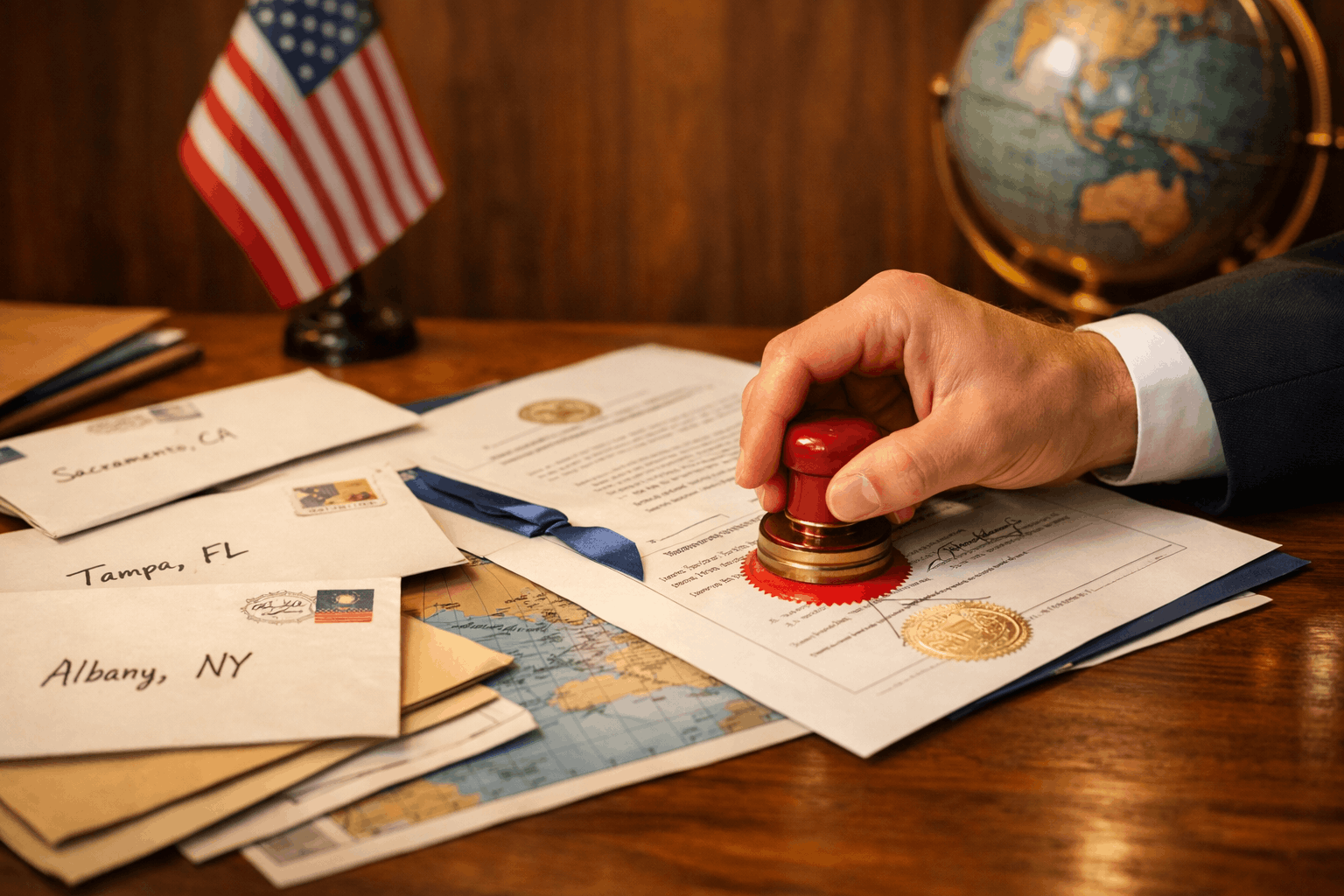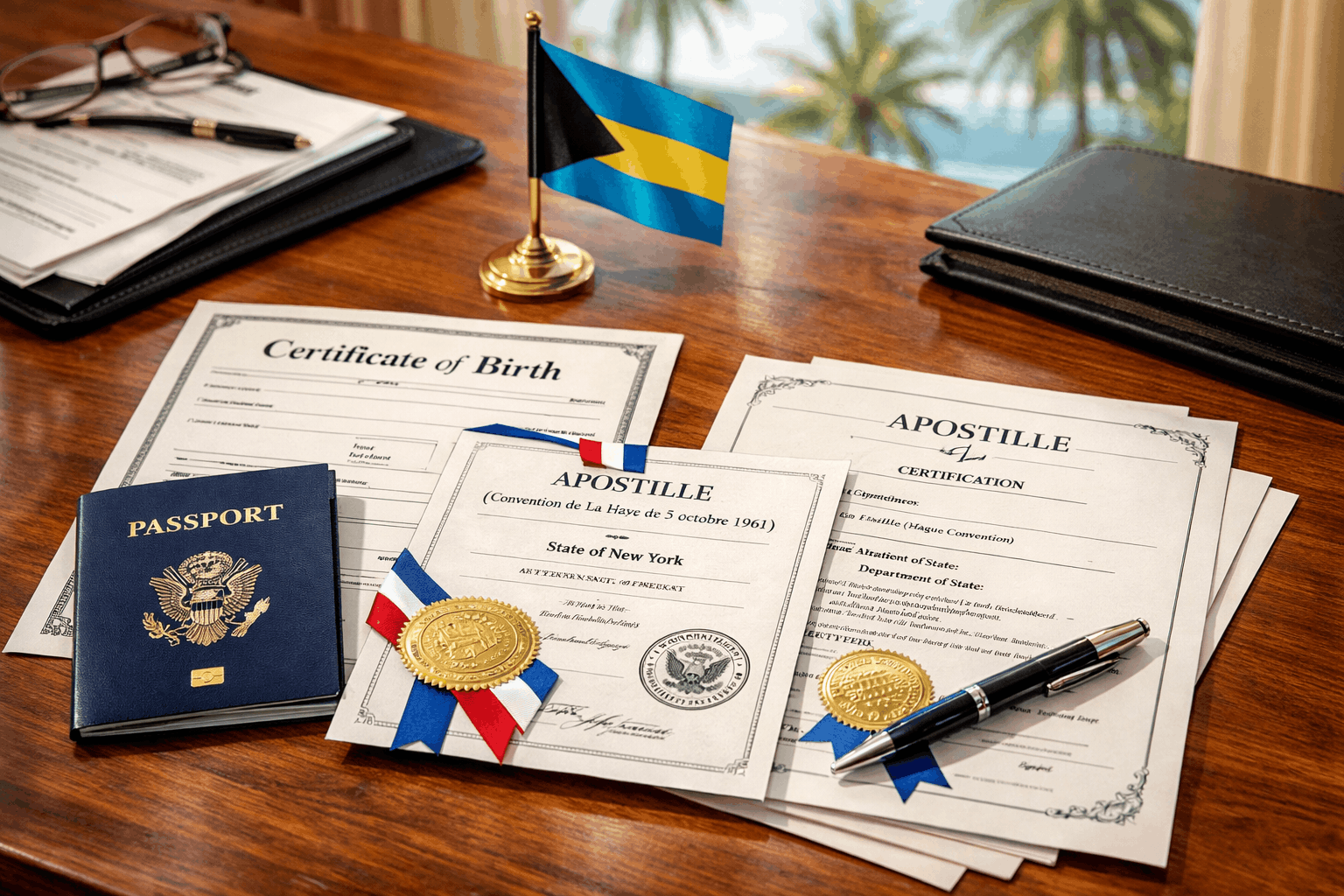
What’s the Difference Between Apostille and Authentication?
If you’re staring at a stack of documents and not knowing whether you need an apostille or authentication, many feel the same way. The difference between an apostille and authentication is confusing even for seasoned travelers. Selecting the wrong path will result in wasted time and effort. This post will clear the fog about authentication vs apostille, so you can equip your paperwork with the right global stamp for a smooth journey ahead.
Apostille vs. Authentication: Key Differences Explained
Let’s begin with the fundamentals. The key to understanding apostille vs authentication is examining how each process works — who oversees them and where they take effect. Besides the definitions of each approach, we’ll also touch on what you can expect for costs and timelines in this section.
Definition of an Apostille: A Streamlined Method
An apostille is a simplified version of certification that validates domestic paperwork for legal use overseas. The apostille’s meaning is centered around a single-step verification of signatures or seals, hence proving a document’s authenticity and legal binding. This method is characterized by speed and standardization, and it completely bypasses embassy legalization.
Definition of Authentication: A Multi-Step Process
Authentication of a document involves sequential steps where it has to be verified by a series of authorities. As part of the process, your records must receive an approval stamp from a notary, the county clerk, the Secretary of State, and the Department of State. Finally, you’ll need to send the paperwork with all of these certifications to the consular office of the destination country for legalization.
Which Authorities Handle Apostille vs. Authentication
The authority that is in charge of the process is also a differentiator. The sole government agency that issues the apostille is the Secretary of State where the document originates. On the other hand, the document authentication process entails several authorities — starting with a notary public or a county clerk, followed by the Secretary of State and the DOS, and ending with legalization at the foreign embassy or consulate.
Countries Covered by Each Method
The apostille is recognized by over 120 countries that have signed the Hague Convention, including many popular destinations in the EU, Latin America, and Asia, such as France, Brazil, and Japan. For other non-members of this treaty, authorization is required for more thorough verification of the paperwork. Hence, you need to go through authorization and, ultimately, legalization when traveling to China, Qatar, or the UAE.
Typical Timeframes and Associated Costs
The single-step apostille is generally more time-efficient and affordable, ranging from days to a few weeks at a cost of between $3.00 and $20.00 per document, varying by state. Authentication is inherently longer — sometimes months due to backlog — and involves multiple charges at each stage, such as state and federal processing fees. Expedited options are available for both, but also at a premium.
Common Misconceptions About the Apostille and Authentication
With the main differences outlined, many people still confuse apostille and authentication with other legal processes like notarization, or assume they’re interchangeable. We’ll clarify these major misconceptions to ensure you have a clear picture of their scope and functions.
Why Apostille Is Not the Same as Notarization
Doubts often stem from mixing up terms, particularly apostille vs notarization. Keep in mind that an apostille isn’t the same as notarization. While notarization might be a prerequisite for getting an apostille, it only acts as a local validation. The apostille is a higher-level stamp, making that notarial act effective in foreign jurisdictions. Both verify paperwork, but they serve different geographical areas.
Why Authentication Is More Than Just Embassy Legalization
Authentication is a multi-layered process, starting with state certification, continued by federal validation by the DOS, and finally reaching embassy legalization. It’s fair to say that authentication is the entire chain of the verification journey domestically and internationally, while legalization is the last stop to confirm the paper’s legitimacy for use in that specific destination.
Why Apostille and Authentication Cannot Replace Each Other
An apostille can’t substitute for authentication and vice versa. The Hague Convention dictates the legal framework for the apostille, and thus, it’s only valid in the signatory nations of the treaty. Other non-participating countries still require full authentication and embassy legalization, so if you submit an apostille to one of them, it will be rejected immediately. Select the correct method to ensure compliance.
How to Determine Which Process You Need
Now that we have cleared up misconceptions, let’s discuss how to choose the right path and learn from some practical tips to prevent pitfalls. With careful prep strategies, you’ll have your documents processed correctly the first time without guesswork or costly resubmissions. Here’s what you should do to pick apostille vs legalization:
Checking the Rules of Your Destination Country
You first need to confirm whether your destination country is a member of the Hague Convention or not. Visit the country’s official website, such as the embassy or ministry, to consult related resources on requirements. You may also check the updated list of members online: if the country appears on the list, you can use an apostille there. Otherwise, opt for the authentication process. Quick research now saves you from many troubles later.
Practical Tips for Avoiding Mistakes
To prevent errors, always review document eligibility carefully before submission. Follow the specific guidance of the foreign authority and ensure the paperwork is properly notarized or certified if required, and maintain copies of everything. Hire the professionals when you’re unsure of the steps or have multiple documents with a tight timeline. This investment guarantees hassle-free international acceptance.
Real-Life Scenarios to Illustrate the Difference
Theory is one thing, but how do the apostille and authentication play out in real-life situations? Walking through some examples will make the distinction clearer. Here are the common scenarios showing how the process applies correctly, so the paperwork will be accepted without issues by the receiving country.
Apostille Example: Documents for France
Suppose you’re getting married in France and need to submit your Florida birth certificate. Since the destination is a Hague member, you can simply request an apostille from the Florida Department of State. The apostille certification is affixed to your birth certificate, verifying the document for international use. Submit it directly to the foreign authority — no further steps are needed.
Authentication Example: Documents for the Kuwait
Consider you’re relocating to Kuwait for a job opportunity and must provide your university diploma. Because of the non-member status of this country, you’ll need to go through authentication. After obtaining a properly notarized copy from your academic institution — like Cal State, for instance — submit the request for authentication to the California Secretary of State. From there, it continues to go to the DOS for federal authentication, and ultimately, the Kuwaiti Embassy for legalization.
Mixed Situations: When Both May Apply
For complex business transactions involving both Hague member and non-member countries, a single set of corporate documents must be apostilled and authenticated for them. Let’s say you send these documents to Germany and China for a merger, you’ll need to prepare apostilles for the former and go through legalization for the latter. Although this seems complicated, a good differentiation of these two approaches ensures your authenticated paperwork is heading in the right direction.
Summing Up Apostille and Authentication
Securing your document’s recognition overseas starts with choosing the precise certification method, which is dictated by the country of its intended use. The core distinction of an apostille vs authentication lies in whether the destination is a Hague member or not. Following the correct validation process enables you to accomplish international success without sacrificing money, time, and most importantly, your mental health.
FAQ
Can an apostille ever be revoked or considered invalid?
Yes, if foreign authorities find that the underlying documents have been altered or they’re suspicious of fraudulent activities after the apostille’s issuance.
How can I verify the authenticity of an apostille online or through a registry?
You can enter the unique reference number of your apostille on the issuing authority’s online verification portal or registry to confirm its authenticity.
What is an e-Apostille, and where is it accepted?
An e-Apostille is a digital apostille that features electronic signatures and seals and serves the same purposes as the print ones. It’s valid in countries that support digital verification systems under the electronic Apostille Program (e-APP). Other members of the Convention also accept it, but always check for specific guidelines.
Do apostilled or authenticated documents also need to be translated?
Translations are sometimes required by the destination country. In this case, you’ll typically need to provide certified translations alongside your documents when submitting an apostille or authentication request.
What happens if the destination country changes its requirements after the documents have already been issued?
You might need to restart the process or update your current paperwork to meet the new standards if necessary. For instance, this means obtaining an additional certification when the receiving institution changes its policy.
Are digitally issued documents with an e-Apostille recognized the same way as paper originals?
Yes. Digital paperwork with an e-Apostille is legally equivalent to the traditional paper-based version in countries that participate in the e-APP. However, some member nations might not accept the electronic format, so it’s recommended to check with the destination authorities for their specific policy on e-Apostille.





